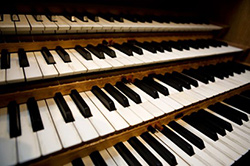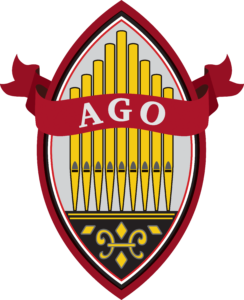The AGO is excited to award two scholarships for students enrolled in master’s and doctoral degree programs in sacred music. The scholarships are made possible through the generosity of Dave Kopp and Ronnie Stout-Kopp. They were inspired by the rich tradition of sacred music at the Salisbury Cathedral in England: “It is our hope that we can encourage and enable gifted organists, choral leaders, and musicologists to pursue their passion for sacred music, and to relieve some of the financial pressure associated with graduate degree work. We also hope to establish a legacy of excellence in sacred music through advanced degrees at both the master’s and doctoral levels.”
The Salisbury Scholarships support full-time graduate students in their development as performers, conductors, or academics in the field of sacred music. Two annual Salisbury Scholarships in the amount of $10,000 apiece will be awarded each year to a master’s and doctoral student, with a total annual distribution of $20,000. Past recipients may reapply but renewal of the scholarship is not guaranteed. The AGO accepted scholarship applications from March 15 to May 15, 2024 for the 2024-2025 academic year. Applicants had to complete a FAFSA application prior to submitting their Salisbury Scholarship application and be an AGO member in good standing.
Application Requirements for the 2024-2025 Scholarships
The Salisbury scholarships are offered for advanced study in organ performance, musicological study, or choral conducting. Specific requirements depend on the applicant’s field of study.
Organ performance: three video recorded performances of 1) a repertoire piece composed before 1800, 2) a repertoire piece composed after 1800, and 3) any one of three hymns (please use the version provided): 1. Of the Father’s Love Begotten – Divinum mysterium (verses 1, 2, and 5), 2. Sacred Head Now Wounded – Herzlich tut mich verlangen, and 3. Praise, My Soul, the King of Heaven – Lauda anima. Your hymn performance should include an introduction. It should be a full rendering (all verses, unless specific verses are indicated above), as if you were leading your congregation in singing the entire hymn. If the required version of the hymn includes a harmonization, re-harmonization is allowed. The hymn performance time should not be longer than 5 minutes, and the total performance time for all three video recorded performances should not exceed 30 minutes.
Musicological study: A 10-15 page research paper on one of the following topics: 1) A brief history of ecological hymnody. 2) A study of selected sacred choral music written in the 21st century by composers from under-represented populations. 3) A brief history of the jazz Mass. 4) A comparative study of selected choral settings of Ave Maris Stella. 5) A comparative study of the theological aesthetics of Thomas Aquinas and Nicholas Wolterstorff. 6) Employing non-western musical styles in mainline Judeo-Christian worship in the United States: an historical overview. 7) A comparative study of the French classic duo and the German bicinium in the organ literature of the Baroque era.
Choral conducting: four video recorded performances 1) Gloria from William Byrd’s Mass for Four Voices: https://www.cpdl.org/wiki/images/f/f8/Byrd_Gloria.pdf 2) A choral piece from the 18th or 19th century, 3) A modern choral piece by a living composer, and 4) a 15-minute video showing the applicant rehearsing a choral group in preparation for a performance.
Students Awarded for the 2023-2024 Academic Year
Jiae Kwak, master’s award – University of Rochester Eastman School of Music
Nara Lee, doctoral award – Indiana University Jacobs School of Music
Students Awarded for the 2022-2023 Academic Year
Jiae Kwak, master’s award – University of Rochester Eastman School of Music
Jaime Carini, doctoral award – Indiana University Jacobs School of Music
Students Awarded for the 2021-2022 Academic Year
Oliver Lear, master’s award – University of Rochester Eastman School of Music
Mihail Strezev, doctoral award – University of Rochester Eastman School of Music


